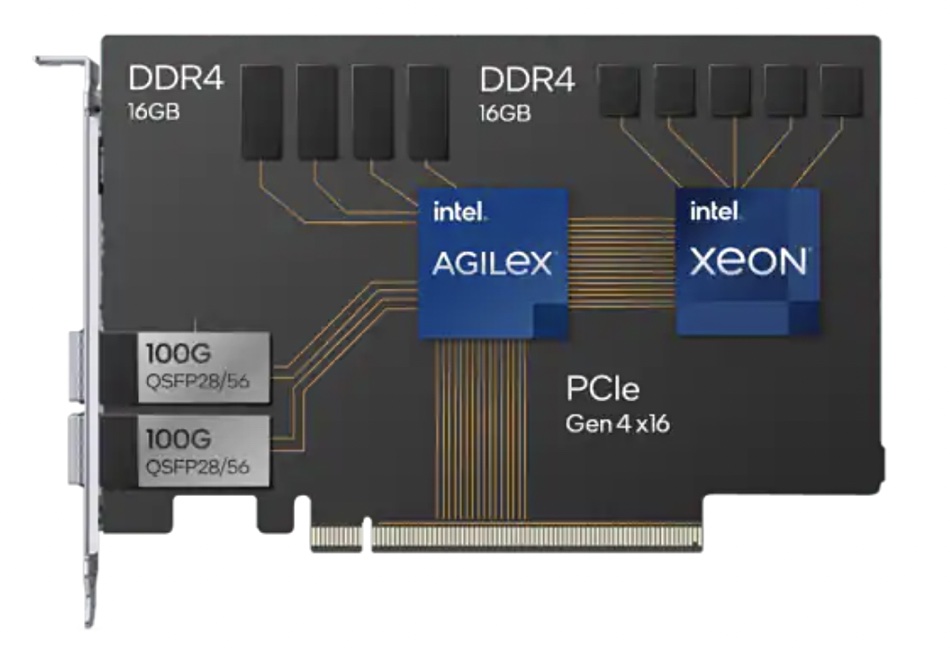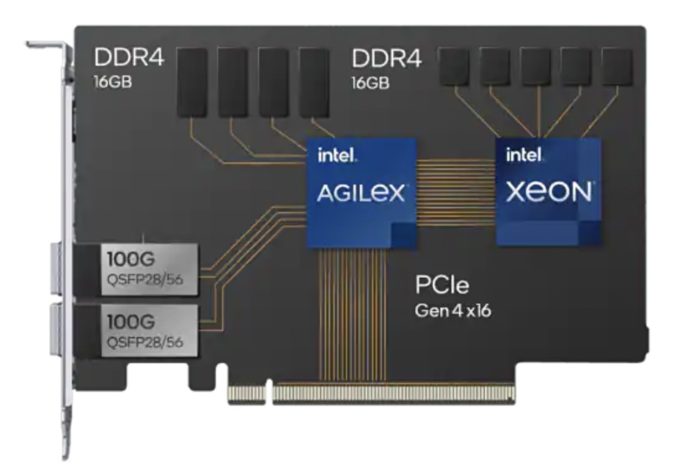Intel is partnering a Chinese server vendor, a Chinese network system supplier and an Israeli server NIC supplier to push its Oak Springs Canyon IPU server offload technology into the market.
The IPU, or Infrastructure Processing Unit, is Intel’s term for a SmartNIC — a plug-in server card that handles low-level network, security and storage tasks, relieving the server CPU so it can focus on application processing. Intel publicised two IPU technologies back in August: Oak Springs Canyon and Mount Evans. The former is based on an Agilex FPG linked to a Xeon-D CPU with16-cores supporting 2x 100Gbit links, while the latter is an ASIC-based IPU on a chip that supports 4x 100Gbit links.
Now Intel says it is collaborating on Oak Springs Canyon-based IPUs with server supplier Inspur, network systems vendor Ruijie Networks and NIC supplier Silicom. Patrick Dorsey, a VP in Intel’s Programmable Solutions Group, provided a somewhat bland statement: “Collaborating with these innovative partners extends the secure and programmable benefits of the IPU platform to a broader set of customers.”

Well, yes, indeed. But, apart from Inspur, which is a huge server and cloud service vendor, the others are less well known and don’t have the impact of, say, an Arista or Juniper or even Cisco. Also, Mellanox has snaffled Dell EMC and HPE server interest with its BlueField SmartNICs and the VMware Project Monterey to have the vSphere hypervisor run on BlueField.
Nevertheless, Intel is Intel and has an awesome presence in the server market so these three partnerships — coming four months after Oak Springs Canyon was first revealed — are good signs of progress.
The Oak Springs Canyon IPU supports OVS (Open Virtual Switch), NVMe over Fabrics and RoCE, and has a hardware cryptographic function to enhance security. Inspur will design and build IPU offerings using Oak Springs Canyon. So too will Ruijie Networks, with 1Gbit and 200Gbit options, and Silicom, but with 200Gbit links.
The SmartNIC/IPU plug-in card market is a segment of the general data processing unit (DPU) market, with vendors not yet agreeing on how and where SmartNICs, IPUs and DPUs overlap. A common attribute is that they all offload host x86 server processors, but they can also help develop a secure DPU-based networking fabric connecting general application processors and specific processors — such as GPUs and AI-focussed processors — with external storage resources.
It is not yet clear how a composable datacentre infrastructure would aid in the dynamic set-up and tear-down of servers — either CPU and/or GPU and AI-processor based ones — network and storage resources to such a DPU-based fabric. Fungible, an Intel DPU competitor, has its own vision of how this will take place.
Were Intel able to integrate its IPUs on Xeon dies, then that might give it a convincing future answer to plug-in card SmartNICs and competitor IPUs: re-integrate the offload functions in silicon attached to the Xeon cores.
Intel is holding a virtual FPGA technology event from December 6 to 9, and will, it says, showcase its FPGAs, SmartNICs and IPUs with presentations and developer-focussed webinars.







